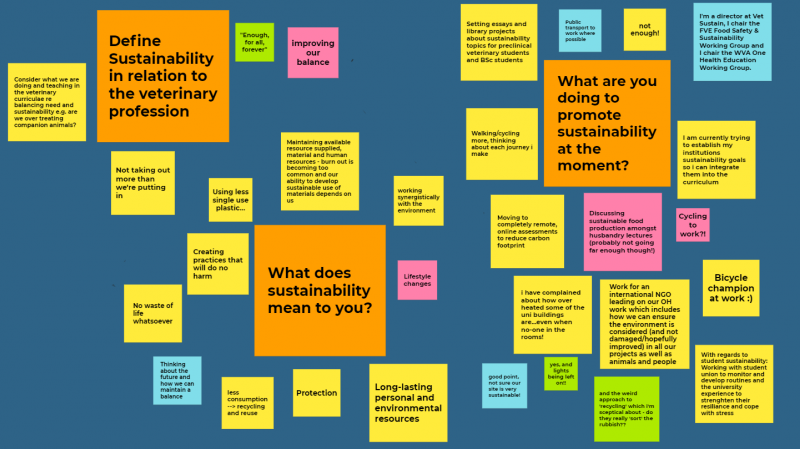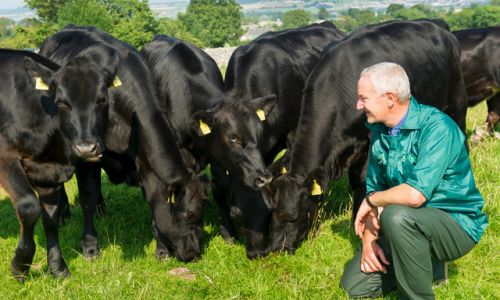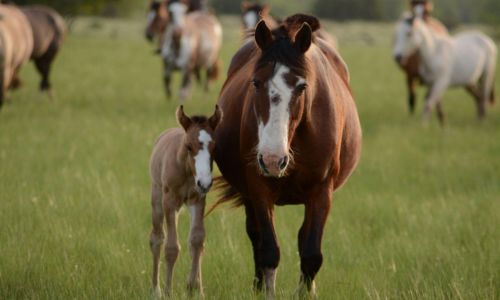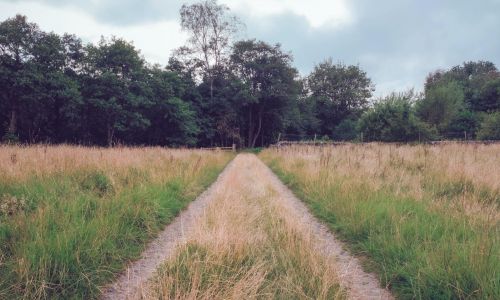Building a sustainable future veterinary profession through curriculum change
A group of vets, students and educators delivered a workshop for the Veterinary Education symposium (VetEd) 2021 to facilitate discussion on the current state of sustainability teaching at vet schools within the UK and beyond.
Emily Neve, Vet Sustain Champion and Vet Student at the University of Cambridge
A group of vets, students and educators delivered a workshop for the Veterinary Education symposium (VetEd) 2021 to facilitate discussion on the current state of sustainability teaching at vet schools within the UK and beyond, and to discuss strategies to fill gaps in the curriculum. In this blog, Vet Sustain Champion and Vet Student at the University of Cambridge, Emily Neve, provides an overview of the day.
The veterinary curriculum develops graduates with problem solving skills who can tackle novel and difficult situations – key skills in a rapidly changing world. Despite the unique position of the profession at the boundary of human, animal and environmental sciences, sustainability concepts are rarely taught explicitly in veterinary curricula (Kramer et al., 2020), even though students have advocated for the inclusion of sustainability concepts in higher education curricula for over 40 years (SOS-UK, 2021).
Therefore, the VetEd symposium seemed like the perfect platform to open up a discussion on how to create a future-thinking, resilient profession based on the foundations of long-term sustainability. Coordinated by Sharon Boyd, the Chair of Vet Sustain’s curriculum working group, Vet Sustain student champions and members of the Vet Sustain curriculum working group led a workshop on sustainability with the aim of building a partnership with veterinary educators and students from a variety of backgrounds.
"The morning integrated a mixture of talks, videos and breakout room discussions facilitated by the inspired use of interactive ‘jamboards’ which allowed participants to easily work together to share ideas. This demonstrated some of the innovative approaches to teaching that have evolved over the past 18 months of online learning."
After introductions and a short presentation on the Sustainable Development Goals, the workshop kicked off with the first set of jamboard questions. These asked for definitions of sustainability and what this meant to people, with further slides asking where sustainability was currently being delivered in the curriculum and the barriers to this being achieved (‘time’ and ‘space’!). It was great to see personal action being taken on sustainability, such as thinking about journeys to work and starting to include sustainability concepts in teaching. However, it was clear from this early stage in the discussion that explicit teaching and signposting of sustainability topics within the curriculum is currently lacking.

Image: A slide from the first jamboard created during the morning, discussing the three questions shown in orange
Next, a breakout room activity gave participants the opportunity to discuss three strands: key sustainability themes for the veterinary curriculum, the sustainability of veterinary processes, and the role of the veterinary professional in advocating for sustainability beyond the profession. These discussions highlighted what were felt to be some of the most important issues facing the profession, including waste reduction, sustaining the motivation of veterinary professionals/the team, and responsible use of medicines.
This was followed by a presentation from Niamh Kinch and I, clinical year students from the Universities of Edinburgh and Cambridge respectively, on students’ perspectives relating to current teaching. The presentation included the results of a survey of Cambridge students on sustainability teaching at Cambridge, conducted by Fiona Shuttleworth, which demonstrated the disparity between the strong interest in the topic and low levels of perceived knowledge. An example of sustainability successfully being integrated into the curriculum at Edinburgh was also discussed. As part of the SPACES (Synoptic Problems and Cases) project, case-based learning has been used to engage students by applying sustainability principles to a surgical scenario, including discussion of reusable drapes and reducing water waste. For more information on the SPACES project, see here.

Figure 1: Interest of sustainability within the veterinary profession; 1(not very interested), 5 (very interested)

Figure 2: Knowledge of the impacts of the veterinary profession; 1(not very knowledgeable), 5 (very knowledgeable)
Selected figures from ‘Perceptions of the environmental impacts of the veterinary profession, with a focus on the teaching of sustainability within the Queen’s Veterinary School Hospital (QVSH), Cambridge’ (Fiona Shuttleworth, 2021)
A final breakout room activity then gave participants the opportunity to create one short-term (1-2 years) and one long-term goal (5 years), which they believe would help to integrate sustainability in the veterinary curriculum. Common discussion points included integrating sustainability into learning objectives for the curriculum and EMS, creating working groups to take into account the views of students, and making use of individuals with higher expertise to ‘educate the educators’.
"The aim of this event was not to provide all the answers, but rather to open up the discussion on what students, educators and veterinarians want from sustainability teaching in the future curriculum.
It was inspiring to see a range of practical ideas on both individual actions and curriculum changes that can be made, some of which are already being put into practice. With a group of passionate people there to drive it, change is not far off."
Thank you to everyone involved in putting together and participating in this fabulous session, and to the Vet Ed symposium for providing a platform to discuss sustainability teaching.



